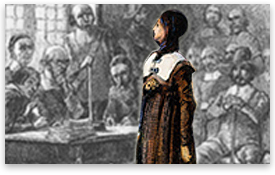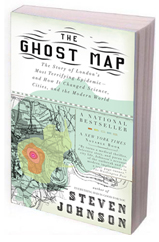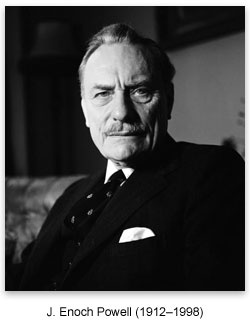 Last month, I mentioned America’s first individualist anarchist, Anne Hutchinson. She’s a hero of mine, for obvious reasons, despite my not sharing her religious beliefs.
Last month, I mentioned America’s first individualist anarchist, Anne Hutchinson. She’s a hero of mine, for obvious reasons, despite my not sharing her religious beliefs.
One of the several reasons I’m enjoying Sarah Vowell’s The Wordy Shipmates is that I’m learning more about Hutchinson. For example, I love this detail:
The daughter of a persecuted Puritan minister who helped her cobble together the best education possible for female children (who were denied university attendance), Anne Hutchinson is one of the brainiest English-women of the seventeenth century. Yet she is no stranger to the goopy fluids of female biology. Besides birthing her own litter [of 15 children, by the way!], she works as a midwife, delivering babies and no doubt serving the brew imbibed before and after labor, the wonderfully named “groaning beer.”
Here’s my favorite detail within the detail:
By aiding Boston’s new mothers, Hutchinson quickly befriends a lot of women. She starts leading the women in a regular Bible study in her large, fine home.
These Bible-study group became the seedbed of antinomianism: a new religious individualism (and heresy) within New England Puritanism. It also became the basis of political and philosophical individualism more generally, thus Murray Rothbard’s description of Hutchinson in Conceived in Liberty as America’s first individualist anarchist.
She preached the necessity for an inner light to come to any individual chosen as one of God’s elect. Such talk marked her as far more of a religious individualist than the Massachusetts leaders. Salvation came only through a covenant of grace emerging from the inner light, and was not at all revealed in a covenant of works, the essence of which is good works on earth. This meant that the fanatically ascetic sanctification imposed by the Puritans was no evidence whatever that one was of the elect. Furthermore, Anne Hutchinson made it plain that she regarded many Puritan leaders as not of the elect.
The Massachusetts powers that be understood that Hutchinson’s Bible-study sessions were central to the dissemination of her religious and political heresies and so, as Sarah Vowell relates,
In September of 1637 … [t]hey resolve, writes Winthrop, “That though women might meet (some few together) to pray and edify one another,” assemblies of “sixty or more” as were then taking place in Boston at the home of “one woman” who had had the gall to go about “resolving questions of doctrine and expounding scripture” are not allowed.
"The Bill of Rights," Vowell comments, "with its allowance for freedom of assembly, is a long way off."
…
Hutchinson, homeschooling, Harvard, and heresyRead More »



 Last month, I
Last month, I 